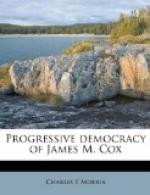“In the midst of war the present senatorial cabal, led by Senators Lodge, Penrose and Smoot, was formed. Superficial evidence of loyalty to the President was deliberate in order that the great rank and file of their party, faithful and patriotic to the very core, might not be offended. But underneath this misleading exterior, conspirators planned and plotted, with bigoted zeal. With victory to our arms they delayed and obstructed the works of peace. If deemed useful to the work in hand no artifice for interfering with our constitutional peace-making authority was rejected. Before the country knew, yes, before these men themselves knew the details of the composite plan, formed at the peace table, they declared their opposition to it. Before the treaty was submitted to the senate in the manner the Constitution provides, they violated every custom and every consideration of decency by presenting a copy of the document, procured unblushingly from enemy hands, and passed it into the printed record of senatorial proceedings. From that hour dated the enterprise of throwing the whole subject into a technical discussion, in order that the public might be confused. The plan has never changed in its objective, but the method has. At the outset there was the careful insistence that there was no desire to interfere with the principle evolved and formalized at Versailles. Later, it was the form and not the substance that professedly inspired attack. But pretense was futile when proposals later came forth that clearly emasculated the basic principle of the whole peace plan. It is not necessary to recall the details of the controversy in the senate. Senator Lodge finally crystallized his ideas into what were known as the Lodge reservations, and when congress adjourned these reservations held the support of the so-called regular Republican leaders.
“From that time the processes have been interesting. Political expediency in its truest sense dwarfed every consideration either of the public interest or of the maintenance of the honor of a great political party. The exclusive question was how to avoid a rupture in the Republican organization. The country received with interest, to say the least, the announcement from Chicago, where the national convention was assembled, that a platform plank dealing with the subject of world peace, had been drawn leaving out the Lodge reservations, and yet remaining agreeable to all interests, meaning thereby, the Lodge reservationists, the mild reservationists and the group of Republican senators that openly opposed the League of Nations in any form.
“As the platform made no definite committal of policy and was, in fact, so artfully phrased as to make almost any deduction possible, it passed through the convention with practical unanimity. Senator Johnson, however, whose position has been consistent and whose opposition to the League in any shape is well known, withheld his support of the convention’s choice until the candidate had stated the meaning of the platform, and announced definitely the policy that would be his, if elected.




